Top Rankings
Fairfield Independent School District ranks among the top 20% of public school district in Texas for:
Category
Attribute
Diversity
Most diverse schools (Top 1%)
For the 2025 school year, there is 1 public middle school serving 398 students in Fairfield Independent School District. This district's average middle testing ranking is 4/10, which is in the bottom 50% of public middle schools in Texas.
Public Middle School in Fairfield Independent School District have an average math proficiency score of 31% (versus the Texas public middle school average of 40%), and reading proficiency score of 47% (versus the 52% statewide average).
Minority enrollment is 48% of the student body (majority Hispanic), which is less than the Texas public middle school average of 75% (majority Hispanic).
Overview
This School District
This State (TX)
# Schools
4 Schools
2,747 Schools
# Students
1,670 Students
1,489,538 Students
# Teachers
124 Teachers
103,135 Teachers
Student : Teacher Ratio
13:1
13:1
District Rank
Fairfield Independent School District, which is ranked #640 of all 1,196 school districts in Texas (based off of combined math and reading proficiency testing data) for the 2021-2022 school year.
The school district's graduation rate of 90-94% has stayed relatively flat over five school years.
Overall District Rank
#632 out of 1204 school districts
(Bottom 50%)
(Bottom 50%)
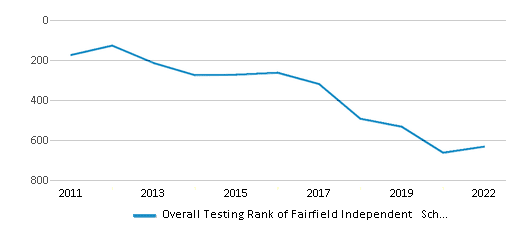
Math Test Scores (% Proficient)
37%
41%
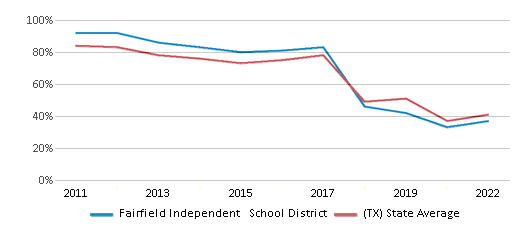
Reading/Language Arts Test Scores (% Proficient)
50%
51%
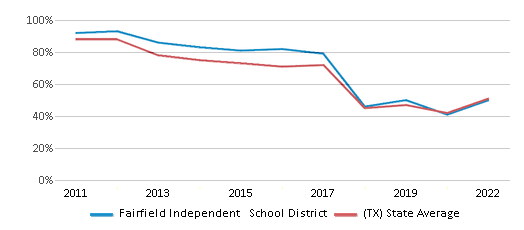
Science Test Scores (% Proficient)
49%
46%
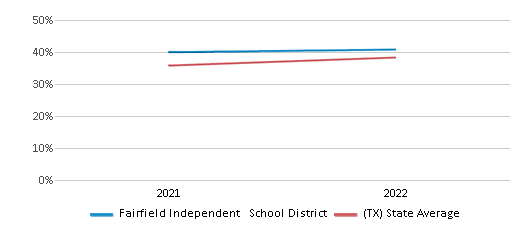
Graduation Rate
90-94%
90%
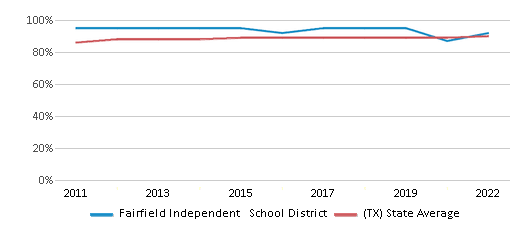
Students by Ethnicity:
Diversity Score
0.64
0.64
# American Indian Students
4 Students
5,199 Students
% American Indian Students
n/a
n/a
# Asian Students
18 Students
77,599 Students
% Asian Students
1%
5%
# Hispanic Students
474 Students
795,444 Students
% Hispanic Students
28%
53%
# Black Students
207 Students
186,072 Students
% Black Students
13%
13%
# White Students
871 Students
378,957 Students
% White Students
52%
26%
# Hawaiian Students
2 Students
2,404 Students
% Hawaiian Students
n/a
n/a
# Two or more races Students
94 Students
43,863 Students
% of Two or more races Students
6%
3%
Students by Grade:
# Students in PK Grade:
70
15,212
# Students in K Grade:
80
21,462
# Students in 1st Grade:
121
22,752
# Students in 2nd Grade:
107
22,958
# Students in 3rd Grade:
122
22,862
# Students in 4th Grade:
115
22,563
# Students in 5th Grade:
134
30,190
# Students in 6th Grade:
126
326,610
# Students in 7th Grade:
142
406,424
# Students in 8th Grade:
130
414,179
# Students in 9th Grade:
150
56,165
# Students in 10th Grade:
133
48,628
# Students in 11th Grade:
131
42,213
# Students in 12th Grade:
109
37,320
# Ungraded Students:
-
-
District Revenue and Spending
The revenue/student of $13,956 is higher than the state median of $13,387. The school district revenue/student has stayed relatively flat over four school years.
The school district's spending/student of $12,937 is less than the state median of $14,116. The school district spending/student has stayed relatively flat over four school years.
Total Revenue
$23 MM
$74,029 MM
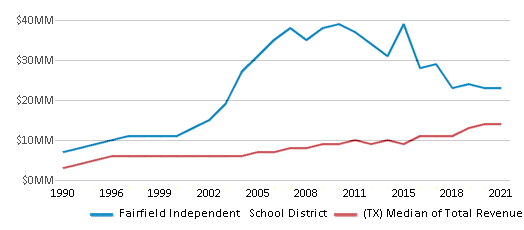
Spending
$22 MM
$78,063 MM
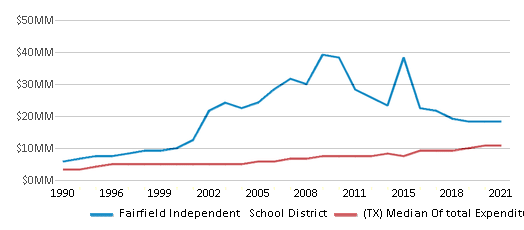
Revenue / Student
$13,956
$13,387
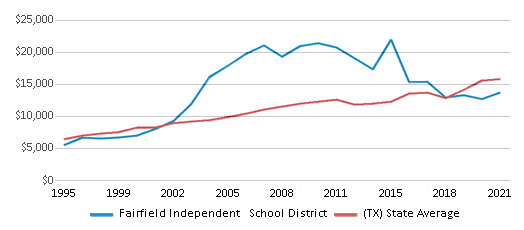
Spending / Student
$12,937
$14,116
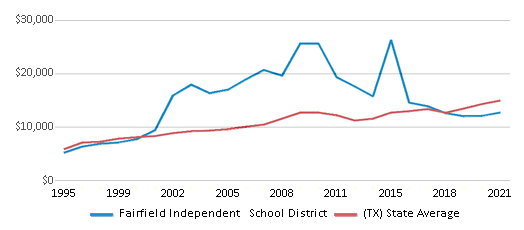
Best Fairfield Independent School District Public Middle Schools (2025)
School
(Math and Reading Proficiency)
(Math and Reading Proficiency)
Location
Grades
Students
Rank: #11.
Fairfield J High School
(Math: 31% | Reading: 47%)
Rank:
Rank:
4/
Bottom 50%10
701 Post Oak Rd
Fairfield, TX 75840
(903) 389-4210
Fairfield, TX 75840
(903) 389-4210
Grades: 6-8
| 398 students
Recent Articles

What Is A Charter School?
Explore the world of charter schools in this comprehensive guide. Learn about their history, how they operate, and the pros and cons of this educational innovation. Discover key facts about charter schools, including admission policies, demographics, and funding, as well as what to look for when considering a charter school for your child.

10 Reasons Why High School Sports Benefit Students
Discover the 10 compelling reasons why high school sports are beneficial for students. This comprehensive article explores how athletics enhance academic performance, foster personal growth, and develop crucial life skills. From improved fitness and time management to leadership development and community representation, learn why participating in high school sports can be a game-changer for students' overall success and well-being.

February 05, 2025
Understanding the U.S. Department of Education: Structure, Impact, and EvolutionWe explore how the Department of Education shapes American education, from its cabinet-level leadership to its impact on millions of students, written for general audiences seeking clarity on this vital institution.





